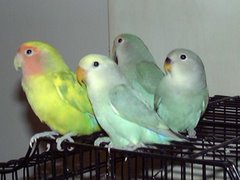Lovebirds Cage Hygiene made easy...
If you keep and breed lovebirds, lovebirds cage hygiene is of utmost importance. That is why cages and aviaries need to be thoroughly cleaned on a regular basis.
Lovebirds cage hygiene needs to be maintained regularly and mostly depends on the size of the cage or aviary, the number of birds living in it, the season, and the amount of droppings, waste food etc.
If you want to save labor costs, you can decide to seive the ground cover of the cage or aviary. In this method, the droppings and waste food can be removed easily.
Any invisible waste cannot, however, be removed by sieving, so that the risk of contamination remains. When you clean the ground cover of the cage, shed, or night house, you should remove the entire layer and replace it with a completely new one.
The best-known and most frequently used type of ground cover for lovebirds is shell sand, but wood chips, clean river sand and even pebbles are sometimes also used as a ground cover.
The walls, bars, and the floor of the lovebird's cage or aviary should be disinfected on a regular basis. You can buy safe-cleaning agents from the pet shops for maintaining lovebirds cage hygiene. Perches, troughs, and baths should also be scrubbed out regularly with a disinfectant. The more hygienically you set about this, the less likely you are to be confronted with problems.
Lovebirds cage hygiene needs to be maintained regularly and mostly depends on the size of the cage or aviary, the number of birds living in it, the season, and the amount of droppings, waste food etc.
If you want to save labor costs, you can decide to seive the ground cover of the cage or aviary. In this method, the droppings and waste food can be removed easily.
Any invisible waste cannot, however, be removed by sieving, so that the risk of contamination remains. When you clean the ground cover of the cage, shed, or night house, you should remove the entire layer and replace it with a completely new one.
The best-known and most frequently used type of ground cover for lovebirds is shell sand, but wood chips, clean river sand and even pebbles are sometimes also used as a ground cover.
The walls, bars, and the floor of the lovebird's cage or aviary should be disinfected on a regular basis. You can buy safe-cleaning agents from the pet shops for maintaining lovebirds cage hygiene. Perches, troughs, and baths should also be scrubbed out regularly with a disinfectant. The more hygienically you set about this, the less likely you are to be confronted with problems.







 Free Ads For Bloggers
Free Ads For Bloggers


1 comment:
Its a shame birds have to live in cages, but with resources and tips like this, lets hope bird owners make their pets lives much happier
All About Horses
Post a Comment